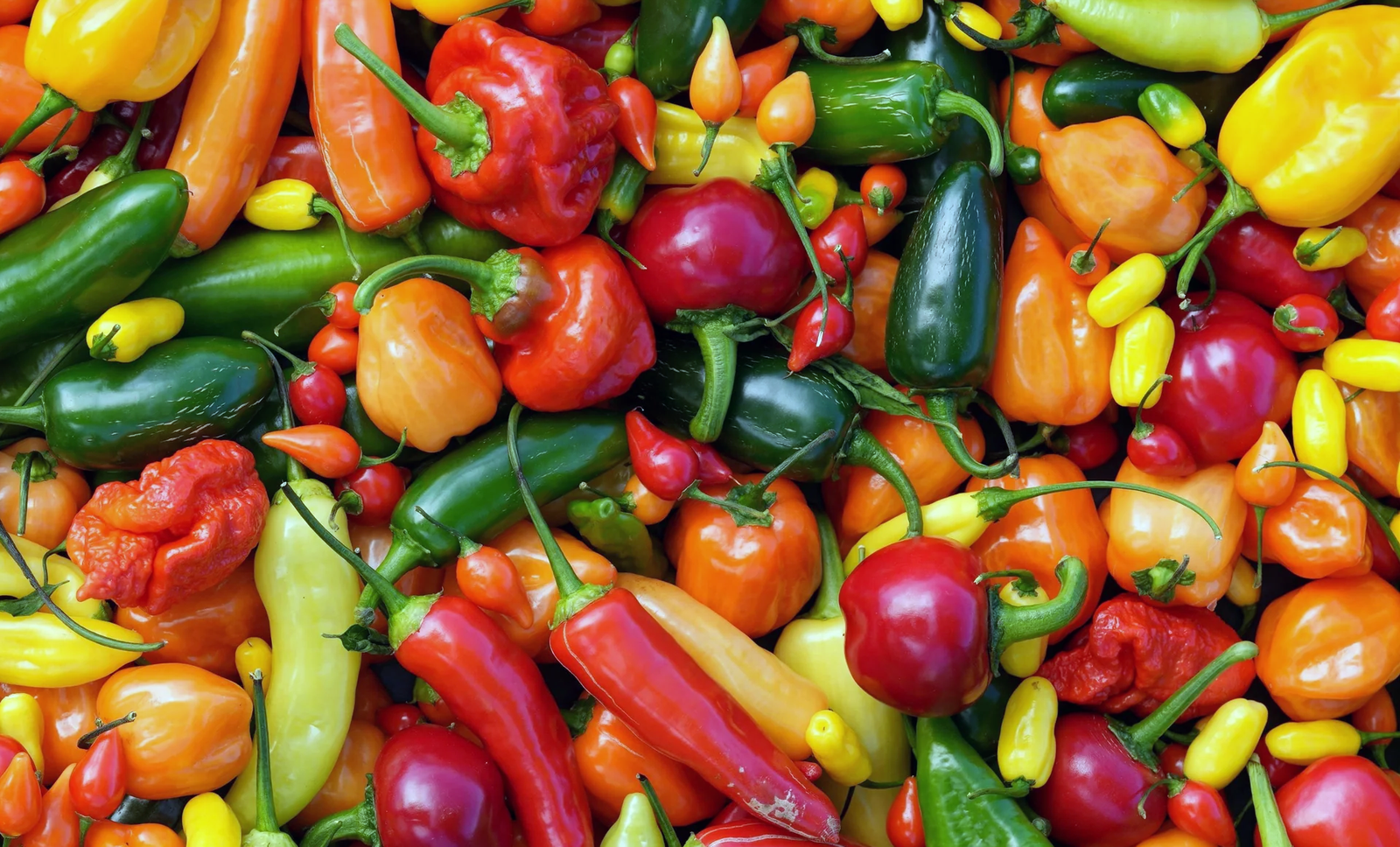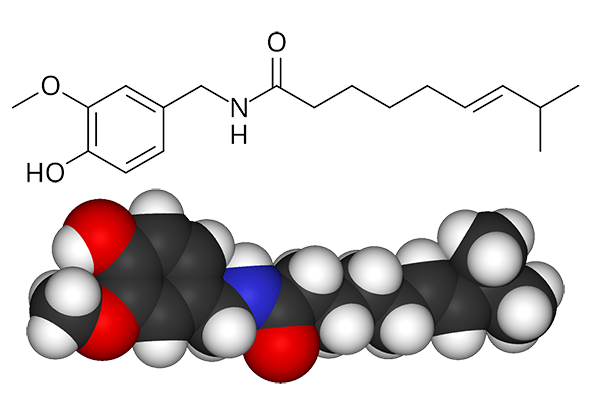FabulousFusionFood's Chilli-based Recipes 3rd Page
 A mixture of different chilli peppers.
A mixture of different chilli peppers.
Welcome to FabulousFusionFood's Chilli-based Recipes Page — The recipes presented here all contain chilli peppers as a main ingredient. Chillies are the fruit of the chilli plant. Along with black pepper, they are unique spices in that they impart 'heat' to a dish without any associated bitterness. The dried and powdered fruit along with the fresh fruit and the dried fruit are all used as spices. As well as their capsaicin induced heat, chillies (depending on the variety or cultivar) can also imbue a dish with a fruity flavour. Smoked chillies are also used to impart a smokiness as well as heat to a dish.
Chilli peppers, also spelled chile or chili (from Classical Nahuatl chīlli [ˈt͡ʃiːlːi]) and known as hot peppers, are varieties of berry-fruit plants from the genus Capsicum, which are members of the nightshade family Solanaceae, cultivated for their pungency. Chilli peppers are widely used in many cuisines as a spice to add "heat" to dishes. Capsaicin and the related capsaicinoids give chillies their intensity when ingested or applied topically. Chilli peppers exhibit a range of heat and flavours. This diversity is the reason behind the availability of different types of chilli powder, each offering its own taste and heat level.
Chilli peppers originated in Central or South America and were first cultivated in Mexico. European explorers brought chillies back to the Old World in the late 16th century as part of the Columbian Exchange, which led to the cultivation of multiple varieties across the world for food and traditional medicine. Five Capsicum species have been widely cultivated: annuum, baccatum, chinense, frutescens, and pubescens.
 The capsaicin molecule, chemical structure (top) and space-filling model (bottom).
The capsaicin molecule, chemical structure (top) and space-filling model (bottom).
When peppers are consumed by mammals such as humans, capsaicin binds with pain receptors in the mouth and throat, potentially evoking pain via spinal relays to the brainstem and thalamus where heat and discomfort are perceived. However, birds are unable to perceive the hotness and so they can eat some of the hottest peppers. The intensity of the "heat" of chillies is commonly reported in Scoville heat units (SHU), invented by American pharmacist Wilbur Scoville in 1912. Historically, it was a measure of the dilution of an amount of chilli extract added to sugar syrup before its heat becomes undetectable to a panel of tasters; the more it has to be diluted to be undetectable, the more powerful the variety, and therefore the higher the rating. Since the 1980s, spice heat has been assessed quantitatively by high-performance liquid chromatography (HPLC), which measures the concentration of heat-producing capsaicinoids, typically with capsaicin content as the main measure
The alphabetical list of all the chilli-based on this site follows, (limited to 100 recipes per page). There are 1756 recipes in total:
Page 3 of 18
| Brôn (Brawn) Origin: Welsh | Calalou (Beninese Callaloo) Origin: Benin | Capitaine, Sauce aux Agrumes (Steamed Catfish with Citrus Sauce) Origin: Mali |
| Brown Sugar Brine for Turkey Origin: Britain | Calalou aux crabes (Crab Callaloo) Origin: Guadeloupe | Carabineiros (Barbecued Prawns) Origin: Guinea-Bissau |
| Brunei Cutlets Origin: Brunei | Calalu Origin: Benin | Carapachos Rellenos (Stuffed Crab Shells) Origin: Ecuador |
| Brunswick Stew Origin: American | Calco Stoba (Conch Stew) Origin: Aruba | Carbonade Flamande Origin: Belgium |
| Buffalo Chicken Pizza Origin: American | Caldeirada de Lulas a Madeirense (Madeira Squid Stew) Origin: Portugal | Cardo con Verdolaga (Pork with Purslane) Origin: Mexico |
| Bufuke with Onion Sauce Origin: Uganda | Caldo Branco (White Stew) Origin: Guinea-Bissau | Cari de Thon (Tuna Curry) Origin: Reunion |
| Bukharan Pilaf Origin: Uzbekistan | Caldo de Arroz de Cebada (Beef and Pearl Barley Soup) Origin: Ecuador | Cari Ourite (Octopus Curry) Origin: Mauritius |
| Bulgur Wan Pot Origin: Sierra Leone | Caldo de Bagre (Catfish Soup) Origin: Ecuador | Cari Poisson (Fish Curry) Origin: Reunion |
| Buljawou Origin: Sint Maarten | Caldo de Bicuda (Barracuda Stew) Origin: Guinea-Bissau | Caribbean All Purpose Seasoning Origin: Jamaica |
| Bumbu Merah (Base Indonesian Red Spice Paste) Origin: Indonesia | Caldo de Camaron (Prawn Soup) Origin: Mexico | Caribbean Creole Sauce Origin: US Virgin Islands |
| Bund Gobi aur Narial (Coconut Cabbage) Origin: India | Caldo de Chabéu (Palm Nut Stew) Origin: Guinea-Bissau | Caribbean Curried Chicken Origin: US Virgin Islands |
| Burmese Curry Paste Origin: Myanmar | Caldo de Citi (Red Palm oil Stew) Origin: Guinea-Bissau | Caril de Camarão (Prawn Curry) Origin: Mozambique |
| Bushmeat Skewers with Cashew Nut Satay Origin: Namibia | Caldo de Mancarra (Chicken in Peanut Sauce) Origin: Guinea-Bissau | Caril de Frango (Chicken Curry) Origin: Sao Tome |
| Bygan Dhal Origin: India | Caldo de Peixe de Guiné-Bissau (Guinea-Bissau Style Fish Stew) Origin: Guinea-Bissau | Caril de Frango com Coco (Chicken and Coconut Curry) Origin: Sao Tome |
| Cëebu Jen II Origin: Senegal | Caldou au Bissap (Flatfish with Hibiscus Flowers) Origin: Senegal | Caril de Marisco (Seafood Curry) Origin: Mozambique |
| Caçarola de Frango com Cominho (Chicken Casserole with Cumin) Origin: Angola | Callaloo Origin: Trinidad | Carne Gizado (Stewed Meat and Vegetables) Origin: Cape Verde |
| Cabbage Egusi Soup Origin: Ghana | Callaloo Soup Origin: Saint Lucia | Carne Mechada Origin: Venezuela |
| Cabbage Kootu (Cabbage in Coconut Milk Gravy) Origin: Malaysia | Callaloo Soup Origin: Sint Maarten | Carri Masala Poule Mauricien (Mauritian Chicken Curry) Origin: Mauritius |
| Cabbage Soup with Spicy Meatballs Origin: Liberia | Callaloo Soup Origin: British Virgin Islands | Cassava Leaf Soup Origin: Liberia |
| Cabbage with Chicken Origin: Guyana | Callaloo Soup Origin: US Virgin Islands | Cassoulet Mauricien (Mauritian Cassoulet) Origin: Mauritius |
| Cabri aux Gombos et Patates Douces (Goat with Okra and Sweet Potatoes) Origin: Senegal | Callaloo Soup Origin: Saint-Martin | Cattail Hearts with Wild Oyster Mushrooms Origin: America |
| Cachupa Rica Origin: Cape Verde | Calulu Carne Seca (Dried Meat Calulu) Origin: Angola | Cauliflower Roti Origin: India |
| Cafréal de Cordeiro (Lamb Cafréal) Origin: Angola | Calulu de Cabara (Goat Meat Calulu) Origin: Angola | Cauliflower with Dorsa Sauce Origin: Algeria |
| Cafréal de Poulet (Chicken Cafréal) Origin: Angola | Calulu de Peixe (Fish Calulu) Origin: Angola | Cayenne Vinegar Origin: British |
| Cafriela de Frango Origin: Guinea-Bissau | Camarones al Ajillo (Garlic Prawns) Origin: Uruguay | Cayenne Vinegar or Essence of Cayenne Origin: British |
| Cailles au Paprika (Quails in Paprika Sauce) Origin: Chad | Camel Chubbagin Origin: Mauritania | Cayman Callaloo Soup Origin: Cayman Islands |
| Cajun Blackening Spices Origin: Cajun | Camel Kebabs with Harissa Sauce Origin: Western Sahara | Cayman Fish Rundown Origin: Cayman Islands |
| Cajun Chili Pork Origin: Cajun | Camel Nihari Origin: Pakistan | Cecena Origin: Niger |
| Cajun Crayfish Bread Origin: Cajun | Cameroonian Burning Fish Origin: Cameroon | Ceebu Jën (Rice and Fish) Origin: Senegal |
| Cajun Crayfish Cornbread Origin: Cajun | Canarian-style New Potatoes with Mojo Sauce Origin: Spain | Ceviche de Atum (Tuna Ceviche) Origin: Brazil |
| Cajun Gravy Origin: Cajun | Cannellini alla Catania Origin: Italy | Ceviche de Corvina (Sea Bass Ceviche) Origin: Panama |
| Cajun Hot Sauce Origin: Cajun | Cape Curry Powder Origin: South Africa | Chaat Masala Origin: India |
| Cajun Tofu Gumbo Origin: Cajun | Cape Malay Dry Red Masala Origin: South Africa | |
| Calabrese Mushroom Chili Origin: American | Cape Malay Red Leaf Masala Origin: South Africa |
Page 3 of 18